

 |
 |
|
 |
|
| About Us |
|
Read Past Issues | Resources | Composer Links |
The
prize announcement describes Chin’s
Born in Seoul, South Korea, in 1961, Unsuk Chin studied piano and composition at Seoul National University. Following lessons in piano and music theory from a very early age, her studies continued at the National University Seoul, including composition with Sukhi Kang. She appeared as pianist at the Pan Music Festivals and in 1984 her composition Gestalten (Figures) was selected for the ISCM World Music Days in Canada and for the UNESCO 'Rostrum for Composers.' In 1985 she moved to Hamburg to study on a DAAD scholarship with György Ligeti, and settled in Berlin in 1988. Initially, her output remained relatively unknown outside electronic music circles. In 1994 she was talent-scouted by Boosey & Hawkes following successful performances of Acrostic-Wordplay, which led to the signing of an exclusive publishing agreement. Her most widely performed work is Acrostic- Wordplay for solo soprano and ensemble, programmed by such leading ensembles as Ensemble Modern conducted by George Benjamin, Birmingham Contemporary Music Group conducted by Simon Rattle, the Nieuw Ensemble of Amsterdam, Asko Ensemble, Ictus Ensemble, and new music groups of the Los Angeles Philharmonic and Philharmonia Orchestra. In
2001 she was appointed composerin-
Chin’s
Violin Concerto, one of her most distinctive works, blends a highly individual
contemporary soundworld with a traditional four-movement classical symphonic
form. Following its Berlin premiere last year, the
Chin’s future composition projects include a stagework for the Los Angeles Opera is planned for premiere in the 2005-06 season, along with a new work co-commissioned by the London Sinfonietta, Los Angeles Philharmonic New Music Group, St. Pölten Festival (Austria), and the Ensemble InterContemporain for premiere in 2005. The Ensemble Intercontemporain has recorded a disc of her works for future release on Deutsche Grammophon, containing Acrostic-Wordplay, Fantaisie mécanique, Xi, and the Double Concerto.
|
|
An Interview with Tobias Picker Handmaid Tale's Debuts in English Rautavaara Joins B&G Who's Afraid of Julia Wolfe Derek Bermel's Soul Garden The Pianist: The Extraordinary True Story of Wladyslaw Szpilman John Adams' Atomic Opera A Bridge Not Far Enough Turnage Signs With B&H Sophie's Wrong Choice Copland's Mexico On Being Arvo Rzewski Plays Rzewski Praising Lee Hyla David Lang's Passing Measures Three Tales at BAM Naxos at 15 On the Transmigration of Souls Dead Man Walking David Krakauer's The Year After Steve Reich/Alan Pierson
|

Quattrains, My Ends are My Beginnings Composer: Milton Babbitt Conductor: Tony Arnold Performer: Jeffrey Milarsky, Charles Neidich, et al., Cygnus Ensemble Bridge Another remarkable gift from Bridge Records, containing the premiere recordings of five Babbitt works that span a quarter of a century. The CD opens with a performance of Babbitt’s exquisite "Quatrains", sung by the young American soprano, Tony Arnold. Set to a text by a Babbitt favorite–John Hollander–"Quatrains" is a work of great delicacy and subtlety. "My Ends Are My Beginnings" is regarded by many as one of most difficult-to-play works for a solo woodwind instrument. The work’s dedicatee, Allen Blustine (long-time clarinetist for Speculum Musicae), gives a heroic reading of this 17 minute solo. |

World to Come Composers: David Lang, Osvaldo Golijov, etc. Performer(s): Maya Beiser Koch Int'l Classics As a performer and promoter of new music, Maya Beiser is peerless--a terrific example of how to package the work of "difficult" composers in a kind of modern hipness without compromising the music or the performance. Here, Beiser's taste and musicality are flawless, a short but brilliant piece by Osvaldo Golijov, familiar works by the always popular Arvo Part and John Tavener, and the centerpiece, a long and moving meditation on 9/11 by David Lang, whose work continues to marvel as it matures and grows in stature.
|

13 Themes for a Triskaidekaphobic The Jeff Kaiser Ockodektet pfMENTUM 2003 Jeff Kaiser's CDs always create a moral dilemma for me because they come packaged in such beautiful, Japanese-style, wrappings that I am reluctant to untie the string to get to the CD itself. Once you get past that point, however, you discover that the music is fresh and inventive and not easily categorized. Is it jazz, with a classical touch? Or classical, with a touch of jazz? Doesn't really matter, it's highly original and the packaging is second to nobody.
|

Re-Issue Various Composers The CD reissue of a noted series of seven 10-inch vinyl eps that Cold Blue released in the early 1980s. Extraordinary music from composers Peter Garland, Rick Cox, Barney Childs, Read Miller, Michael Jon Fink, Daniel Lentz, and Chas Smith. Music for violins and percussion, electric guitar, eletronic keyboards with voices, solo and duo pianos, cello, pedal steel guitar, wind instruments of pre-Columbian design, readers, and more--all precursors of a certain genre of "California ambiance." Highly recommended. |
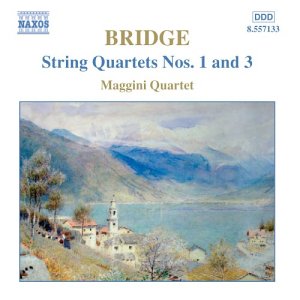
String Quartets 1 & 3 Composer: Frank Bridge Performers:. Maggini String Quartet Naxos Frank Bridge is a bit of a lost horse in the English stable of composers that includes such giants as Elgar, Vaughan Williams and, his student, Benjamin Britten. But he shouldn't be. No. 1, written in 1901, is a mature, fully realized work; No. 3, composed in 1927 is one of the pilars of 20th century chamber music. As always, the Maggini play magnificiently and the recording is first rate. |
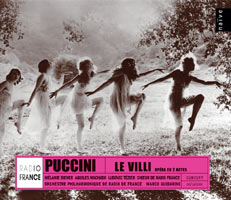
Le Villi Composer: Giacomo Puccini Conductor: Marco Guidarini Performer: Melanie Diener, Ludovic Tezier, et al. Radio France Chorus, French Radio Philharmonic Orchestra Naive Just
listening to young Puccini's first opera (as opposed to seeing it staged
and sung), you notice immediately that the big sweeping melodies, the ingenious
"hooks" are already there. Naive has also issued a Radio France recording
of Puccini’s second opera, Edgar,
written five years after Le Villi. In this more ambitious and
complicated work, Puccini develops his technique using a score that merges
stirring arias and ensembles.
|
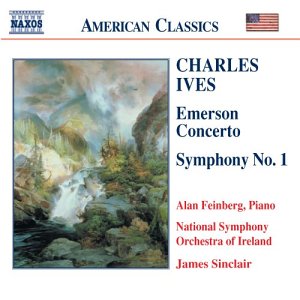
Emerson Concerto / Symphony 1 Composer: Charles Ives Performers: Alan Feinberg (piano), National Symphony Orchestra of Ireland, James Sinclair (conductor) Naxos Ives sketched the Emerson Concerto in 1907 but never fully finished it, although he used portions in other works. David G. Porter, a noted Ives scholar, was able to create a performing version which was premiered in 1998 by Alan Feinberg, the pianist on this premiere recording. The piece is extremely demanding, often abrasive, and demands exceptional virtuosity. Symphony No. 1 is fetching, but not as charateristic, of the great American maverick that followed. |
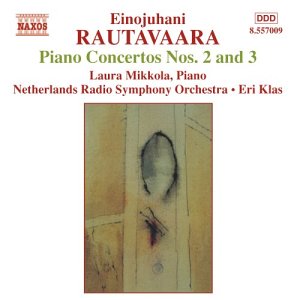
Piano Concertos 2 & 3 Composer: Einojuhani Rautavaara Performers: Laura Mikkola (piano), Netherlands Radio Symphony Orchestra, Eri Klas (conductor) Naxos The Finnish composer Rautavaara has enjoyed enormous success in recent years with his unique blend of northern lights impressionism and romanticism served up in an aura of modernity. His Cantus Articus is immensely popular, conjuring up associations of Messiean, although the latter is a much more important composer. The Third Piano Concerto from 1998 is forceful, drawings on the Russian school of pianism, although it not technically flashy until the finale. The Second, composed nine years earlier, is more traditional and Laura Mikkola, already on disc with a highly regarded account of the First Concerto, again provides an outstanding performance. |
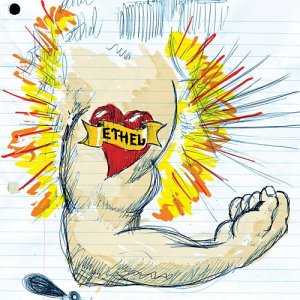
Ethel Composers: King, Kline, Reynolds, Ziporen Performers: Ethel Cantaloupe New
York's most daring string-quartet sensation, Ethel, makes its debut here
with a menu of the kind of hard-edged downtown music that has won the group
a big following in the NY new music scene. Todd Reynolds and
Mary Rowell, violins; Ralph Farris, viola; and Dorothy Lawson, cello—all
began their careers in New York as freelance musicians, playing difficult
music that relies heavily on non-classical sources but requires a virtuoso
classical ensemble to play. Its repertoire ranges from John King's energetic
blues transcriptions to the gnarly quartets of Julia Wolfe
and on Todd Reynolds' quirky
|
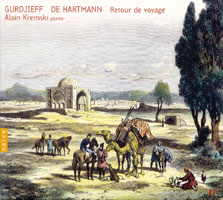
Return from a Journey Composers: Gurdjieff, De Hartmann, Performer: Kremski Naive Gurdjieff
was a Russian Aremenian spiritual master who, in addition to the main body
of his teaching created sacred dances, or Movements, as well as 200
or so musical compositions--all of which were were done in collaboration
with German composer Thomas de Hartmann at Gurdjieff's Institute
for the Harmonious Development of Man, near Paris, in the years 1925–27.
For many years, the pieces heard here were played only by De Hartmann or
another of Gurdjieff's disciples but in recent years they have attracted
the interest of a number of adventuresome pianists. Kremski plays
these exotic, vaguely oriental and oddly thematic pieces with great respect
and warmth.
|
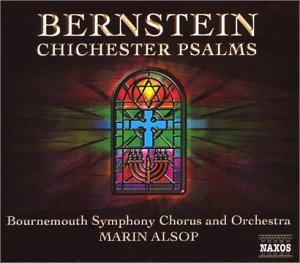 Chichester
Psalms
Chichester
Psalms
Composer: Leonard Bernstein Performers: Bournemouth Symphony Orchestra and Chorus, Marin Alsop (conductor) Naxos Commissioned in 1965 by the Dean of Chichester, Bernstein’s colorful Chichester Psalms is one of the composer’s most successful and accessible works on religious texts, contrasting spiritual austerity with impulsive rhythms in a contemplation of peace. The composer fashioned his Oscar nominated score to the 1954 movie On the Waterfront into a symphonic suite, skillfully capturing the oppression of the New York dockyards in the ’50s. The Three Dance Episodes were extracted from the popular On The Town, Bernstein's first successful foray into musical theatre. Bernstein protege Marin Alsop gets a robust performance from Bournemouth orchestra and chorus. |
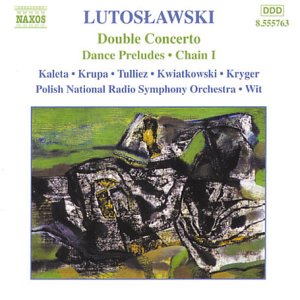
Double Concerto Composer: Witold Lutoslawski Performers: Polish National Radio Symphony, Antoni Wit Volume 8 in Naxos' indispensible survey of Lutoslawski's orchestra work brings us into lesser known territory but there are still treasures to be found. The Dance Preludes from 1955 is basically a five-movement clarinet concerto, with lots of interesting harmonies and rhythmic twists and turns. The Double Concerto for oboe and harp from 1990 rattles the ear a bit and has a demanding oboe part, beautifully played by Arkadiusz Krupa. The Children's Songs, gorgeously sung by the soprano, Urszula Kryger, are beguiling. |

Doña Francisquita Composer: Amadeo Vives Performers: Maria Bayo, Alfredo Kraus, Orquesta Sinfonica de Tenerife, Antoni Ros Marba Naive A superb performance of Amadeo Vives' zarzuela masterpiece, sung with enormous vivacity and brio by the ravishing-voiced Maria Bayo and the sturdy Alfredo Kraus. With its nineteenth century Madrid setting, its roots in classical Spanish drama and its festive nocturnal amours, Doña Francisquita provides a retrospective on the romantic zarzuela tradition and its crowning glory. The work was immediately recognized not only as Vives’ masterpiece, but as the greatest full length zarzuela of its era. If you're not into zarzuela already, this is the perfect place to start your collection. |

Symphony 9 Visionaria Composer: Kurt Atterberg Satu Vihavainen (mezzo-soprano); Gabriel Suovanen (baritone) NDR Choir, Prague Chamber Choir NDR Radio Philharmonic, Ari Rasilainen CPO The 9th and final symphony of Swedish composer Kurt Atterberg bears a superficial relationshp to Beethoven's 9th with its big, expresssive choral sound but Atterburg's world is a good deal less joyous. Atterberg's choice of texts reflects the lasting impact on his psyche made by World War II and the Korean War. The Poetic Edda, an Icelandic epic dating from around 1270, relates the visions of a wise prophetess (hence the Symphony's title "Sinfonia Visionaria") who foretells the creation of the world, the warring among gods, giants, and humans, the world's destruction, and finally its recreation. Atterberg uses mezzo-soprano and baritone soloists with chorus and large orchestra, as well as a quasi-oratorio form, to tell his epic tale. This is extraordinary symphony by a composer who is far too little-known in the musical world. |

The Complete Mazurkas Composer: Karol Szymanowski Performer: Marc-Andre Hamelin Hyperion Marc-Andre Hamelin continues his extraordinary journey through the forgotten rivers and bayous of the modern piano repetoire with masterful performances of Szymanowski's Twenty Mazurkas, Op. 50, composed between 1926 and 1931. After assimilating the influence of Stravinsky, Szymanowski began looking for folk themes in Polish music to rival the Russian folk touches of the master. The Mazurka, a traditional Polish dance in three-quarter-time with an often erratic-seeming emphasis on the second beat, (and a favorite form for Chopin) offered great possibilities . These highly diverse pieces are more complex than Chopin, more modern and dissonant, yet also more muted and elusive. Still, Szymanowski remained too much a romantic to settle for anything less then flamboyant virtuosity--a quality that Hamelin possses by the truckload. |

Accentus Composers: Transciptions: Bach, Barber, Berg, Chopin, Debussy, Mahler, Ravel, Wolf Peformers: : Choeur De Chambre Accentus, Equilbey Naive Worth having for the ravishing performances of Samuel Barber's "Adagio" and Mahler's "Adagietto from Symphony No. 5." |

Symphony No. 6 Composer: Gustav Mahler Performer: London Symphony Orchestra; Mariss Jansons Label: LSO Live It is rare that you find a recording that you need listen to for only a minute to know a masterpiece is unfolding before your very ears. This stunning live performance of Mahler's "Tragic" symphony is one of the rare ones, From the first rhythmic thumps of the long and stately funeral march to the final faded chords, Mariss Jansons draws a passionate and committed performance from the LSO. Certain to be among the best of the year noninees. |

Wheel of Emptiness Composer: Jonathan Harvey Performers: Actus Cyprès CYP5604 English composer Jonathan Harvey is one of those modernists whose work is more frequently talked about then played. This rare recording contains five representative works ranging from the lyrical to the raw, built on instrumentations ranging from electroacoustical to the traditional. An excellent introduction to an unjustly neglected maverick. |

Piano Etudes 1 Composer: Philip Glass Performer: Philip Glass Orange Mountain Glass says he wrote these "studies" as fodder for his own concert performances and as a way of challenging himself as a pianist. But, they are much more important than that. They provide a real insight into how Glass composes and, although billed as sketches, sometimes are more rewarding to the ear and intellect than many of Glass's larger-scale works. Essential recording for the Glassologist. |

Music from the Thin Blue Line Composer: Philip Glass Orange Mountain Glass's hypnotic score for Errol Morris’ extraordinary 1988 documentary film entitled "The Thin Blue Line". Nonesuch Records released a CD of the film’s soundtrack that included the narration and interviews from the film but this Orange Mountain release contains the original score without the voice-over. The music is dark and brooding, full of tension appropriately for such a chilling film, and it stands well on its own. |
 |
Search WWWSearch www.sequenza21.com |
